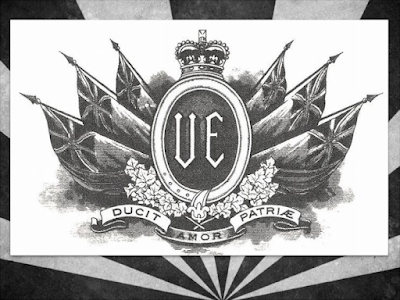Loyalist Day used to be an important annual celebration here in Saint John, New Brunswick. The city traces its founding to the summer of 1783 when 17 ships arrived from New York and Boston harbour, unloading the losers in the American Revolution. They found themselves on a small rocky peninsula, an island at high tide. There was nothing here but rocks and trees, and the winters were severe. That first winter, most built tents insulated by spruce boughs. Someone had to stay awake at all hours to keep the fire going. There was an average of one death each day among them.
Only two years later, they had a royal charter for the first official city in British North America. Saint John, as we know it, had begun.
But in recent years, the city has refused to fund any special activities to commemorate Loyalist Day, the day the first ships landed. The memorial plaque and stone marking where the Loyalists came ashore, was pulled up and abandoned in a quarry on the west side.
When local historians complained, they were told by city council, “We don’t care about those English people.” And someone remarked “I wonder what the native people thought, when they came to steal their land?”
I find this callous, racist, and willfully ignorant. The whole reason Canada exists apart from the United States, is loyalty to the crown and the British connection. If we reject that, if we reject the Loyalists, we reject Canada. And there is no good response to Trump’s proposal for assimilation.
The people who waded ashore that summer were not, of course, English. They were American. Even then, America was something of a melting pot. Among them were 500 freed blacks who had made it to the British lines, for Britain refused to recognize slavery. Although not among the group that landed at Saint John, a significant number were native people, notably the Iroquois of upstate New York. There were Dutch from New York, which had been New Amsterdam. There were many Germans, including discharged Hessian soldiers. There were Jews among the group that landed in Saint John; and of course Scots, Welsh, and Irish. Don’t ever tall a Scot or an Irishman he is English.
But ethnicity should not matter. People are people. Suffering people deserve our sympathy regardless of their skin colour or language or race, and brave people deserve our admiration regardless of where they were born.
Especially when we are their inheritors. This is a question of filial piety: honour thy father and thy mother. We owe them a lot. They laid out the streets, established our forms of government, our first social institutions, many of our sports and pastimes, our cuisine, our arts, our folkways; although of course other groups have contributed since. And the city and nation they bequeathed us is, most certainly, one of the finest we could hope for in this fallen world. Travel a bit and you will see. People want to move here from most other places.
As for the local native populations, the matter is complex. Groups and individuals fought on both sides during the American Revolution; as they had in the French and Indian Wars. They were not passive victims, but participants, in these conflicts. Some lost, just as some Europeans lost.
Broadly speaking, however, European settlers did not steal their land, at least in Canada. Everything was done by treaty, in principle by mutual agreement and with compensation. And the end result: Canada is still 89% unsettled Crown Land—over which, by treaty, today’s native people are free to roam, hunt, and forage as they always did. Only eleven percent of their prior lands have been given over to settlement—and of course, native people have been as free as any other citizens to take up these lands too. They own that eleven percent still in the same sense all other Canadians do.
Back in the day, in 1783, the presence of the European settlers was generally welcomed. It granted the native people security in possession and use of their lands—before this, before treaties and redcoats, warfare was more or less constant. If you encountered a member of a different tribe in the forest, you feared violence. You feared violence at home in your sleep. The presence of Europeans, especially in a place like Saint John, at the mouth of a long river, offered opportunities for trade that made native groups located near a European settlement rich. It gave them military advantages over distant rivals: not just through alliance with the Europeans, but by trading for iron knives and hatchets, guns, horses. And perhaps most importantly, having Europeans nearby protected native people from the ever-present danger of famine: crops, crop storage, and ships arriving with cargo from overseas were far more reliable food sources than the rivers or forest.
Not such a bad deal.
I have not a drop of English blood, so far as I know. I do not believe any of my ancestors were UE Loyalists, But happy Loyalist Day.













No comments:
Post a Comment